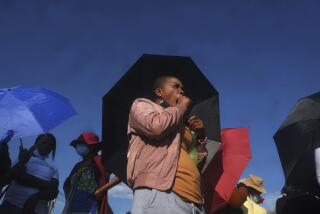Postwar Laos Moves Slowly Toward Development and Modernization
- Share via
VIENTIANE, Laos — While other Asians work around the clock in quest of prosperity, residents of Vientiane still take siestas and jealously guard their weekends.
Vientiane, never the briskest of capitals, virtually came to a halt after the Communists took over in 1975.
Although people here say that the pace has picked up in recent years, children still play in the dry fountain of a central plaza and tethered goats munch the tall grass. Nearby, chickens and turkeys peck in the muddy compounds of government ministries.
Japanese cars are replacing old Soviet and French models, but traffic remains sparse. Offices are closed from 11.30 a.m. until 2 p.m., and weekends are reserved for family and friends.
Since 1986, Laos has pursued a Western-style overhaul of one of the world’s poorest economies. Rigid policies that caused businessmen and tens of thousands of others Laotians to flee the country have been relaxed.
Political reform is nowhere in sight, however, and diplomats note that relations between Laos and China have become especially cordial.
The Chinese merchant class is re-emerging in Vientiane, and small enterprises have sprouted, but there is none of the urgency seen in other Southeast Asian countries such as Thailand, just across the Mekong River.
“Asia’s full of dynamism, but that’s not Laos,” said one Western development expert who requested anonymity. “I think that, in the long term, it will remain a unique case, more like an African country than an Asian one.”
Officials acknowledge that much needs to be done to develop the country, but their motto is “step by step.”
There is still no significant manufacturing base, after 15 years of getting aid from Moscow and Eastern Europe and more recent help from Japan, Sweden, Australia and other Western countries. Annual per capita income in Laos is less than $170.
Officials blame the malaise on the central planning of the past and on inefficient use of aid from Communist allies.
One program sent 50 Laotians to the Soviet Union to be trained as railroad engineers, a Western diplomat said, although Laos has no railroad.
Trade is hampered by a lack of direct access to the sea, and by derelict roads and telephone systems. The 4 million remaining people are spread over an area the size of Britain; most educated Laotians have already left the country.
The infant mortality rate is among the world’s highest, 200 per 1,000 births in some areas. Vannaret Rajaprop, vice minister of health, said: “It is a very important problem for us. We need the labor and manpower for development.”
Among the country’s assets are rich supplies of timber and minerals. Analysts say the unspoiled countryside and tropical climate could be ideal for tourism, but the government shows no enthusiasm for foreign visitors. It has eliminated the drug culture and prostitution that attracted Western “hippies” before 1975, and now grants few visas.
Vientiane has few hotels. In Phone Savane, on the legendary Plain of Jars, the only hotel is made of moldering plywood.
When an aging Soviet Antonov aircraft crashed on landing in 1989, Laos was left with just five domestic passenger planes. Officials say they haven’t enough money to replace the Antonov.
In hopes of obtaining foreign cash to fill some of the gaps, the National Assembly recently passed laws intended to inspire investor confidence. The first Laotian constitution is to be adopted by December.
An estimated $80 million has been pledged from abroad for future projects, but diplomats say most of that is from small companies in Thailand. Some predict that there will be no major investments without political change.
“There have been a lot of new words, but people see the same old faces responsible for past conservative policies,” a Western development worker said. “Some refreshing at high levels might convince people there are some real changes going on.”
Kaysone Phomvihane, 69, has led the Communist Party since 1955 and has been premier since the party gained power.
Somphavan Inthawong, a member of the National Assembly and the senior economic planner, said the government’s priority was to raise living standards, not reform the political structure.
“We should not think about building a rocket to go to the moon when we are one of the world’s 10 least developed countries,” he said. “Questions that are relevant in other countries might not be relevant in our society at the moment.”
Diplomats said that some intellectuals privately favor a multiparty system and some journalists want the rigid press controls eased, but no organized political opposition is evident.
More to Read
Sign up for Essential California
The most important California stories and recommendations in your inbox every morning.
You may occasionally receive promotional content from the Los Angeles Times.












